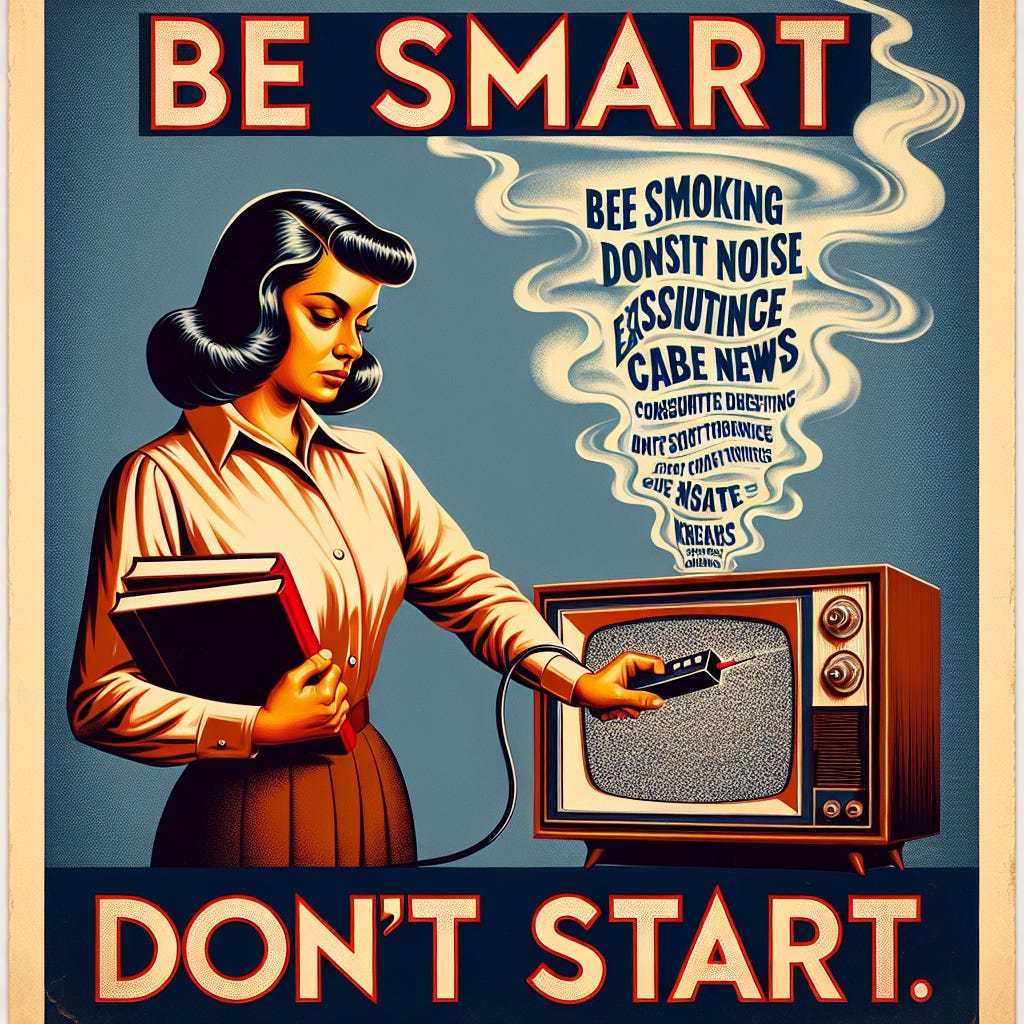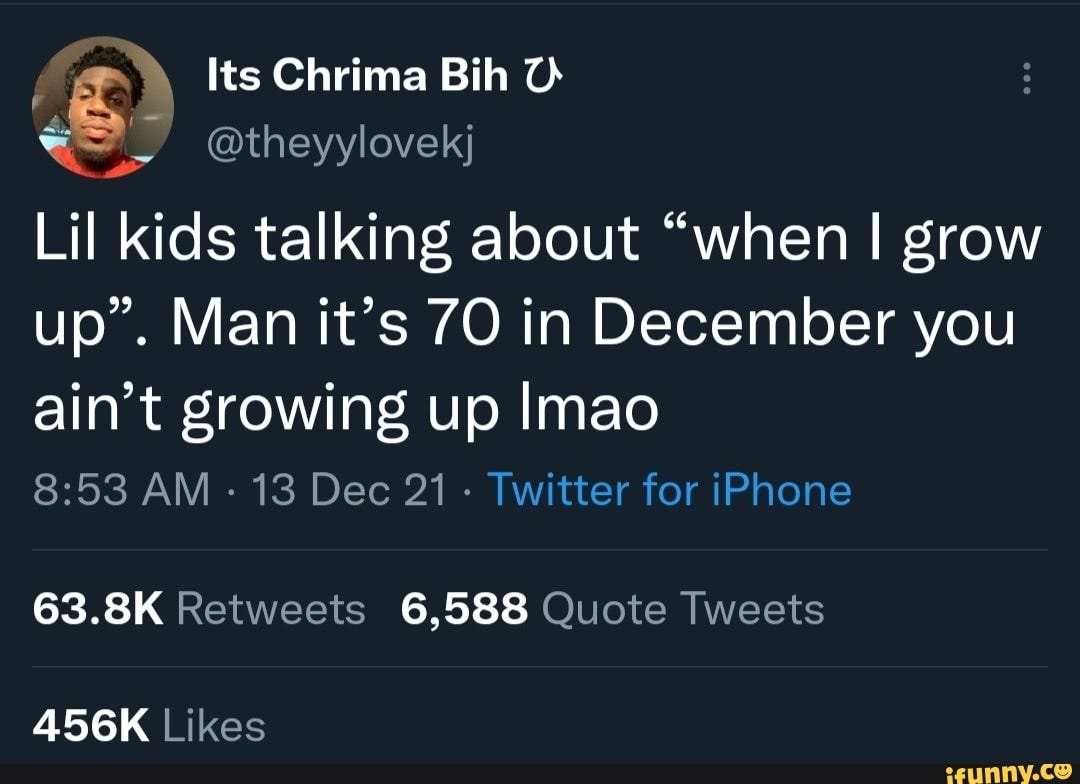Get Out of Your Echo Chamber
Rife with confirmation bias and misinformation, the way we consume information is broken.
The kids finished their courses of antibiotics. The CDC says Erica and I can resume normal activities without freaking everyone out around us with masks. La Befana left candy in the kids’ shoes for Little Christmas (don’t ask, I still don’t get it.) Life - for now - is good. And yes, working on my optimism is on my list of things to do this year.
Another goal is to step outside of my echo chamber. Very often in strategy sessions at work I’ll try to take a step back and make sure we’re viewing a problem or potential solution from a more inclusive viewpoint than just that of a northeast liberal (which is what typically populates a room at large ad agencies.) It’s a good exercise to keep front of mind when on national or global accounts, but is also a good strategy for life in general. So how do we do this?
Stop Watching Cable News. Full Stop.
One of the best things you can do to get out of an echo chamber (or simply not get involved in one) is to avoid cable news. It’s like smoking: if you’re a cable news consumer, stop now; if you’re not, don’t start.
Studies show that the Fox News and the MSNBCs/CNNs of the world are right- and left-leaning echo chambers, respectively. And in a world where attention is one of the greatest currencies for media companies, they have to become more and more outlandish to get eyeballs.
I wrack my brain every now and then to think about the positives that cable news brings to an informed electorate and I continue to come up short. In an age where newspapers no longer rely on the printed word and afternoon editions to break news, but can simply send a push notification to your phone, the “scoop” that cable news programs used to rely on is old hat.

Cable news should be relisted as cable entertainment. Some channels already do this. From a legal perspective, Fox argues their commentators like Tucker Carlson engage in “exaggeration” and “non-literal commentary” and do not “state actual facts.” In other words, their programming is bullshit and they shouldn’t be held to a factual standard on it (the argument worked in court.)
Limit Social Media Use
While quite not the scourge to humanity that cable news is, social media is nonetheless susceptible to the echo chamber effect. While cable news tends to drive the echo chamber in and of itself, social media is able to learn a user’s preferences and use them to algorithmically serve up content that they have determined the user will react well to. In other words, social media is essentially just confirmation bias on steroids.
The greater danger of social media is the misinformation aspect (which a brilliant newsletter touched on recently.) The misinformation factories operating as Meta and X are driven not by partisanship, but actually the “rewards” users get in the forms of like, comments, and shares. Studies have found that a relatively small, but active, group of users is responsible for an outsized portion of misinformation online - and it’s in pursuit of these rewards.
In fact, the internet has addictive qualities and social media platforms play off of these random dopamine hits, akin to the chain-smoking elderly folks crushing the slots at your local casino. The problem has become so large - in particular for the younger among us whose brains are not as fully developed as full-blown adults - that various state attorneys general have filed suit against Meta to try to remedy the problem.

There are some benefits to social media, and it’s not just for your racist uncle to share his opinions on the latest cultural movements or for your fed-up aunt to “reconnect” with that old high school boyfriend. Social media has brought together many people who otherwise would have lost touch, and has created interesting online communities of niche topics that used to be the realm of anonymous forums. Has it gotten out of control? 110%, but to say there is zero benefit from it would be disingenuous.
Leave Your Comfort Zone to Exit Your Echo Chamber
When I entered college I was coming from Boston, had a roommate from the Bronx and a suitemate from Queens. To say our musical taste lined up nicely as squarely East Coast hip hop would be an understatement, but back in those days the dorms were all on the same IP network. This meant when you opened your iTunes, you could see everyone else’s music library.
Being in a 14-story dorm, there was A LOT of new music to peruse. We even allowed kids from California into the university, so I got exposed to West Coast hip hop in a way I never really delved into in high school (outside of NWA, of which I was a superfan.) The 2Pacs and E-40s of the world made it into my iTunes (not only could you share, you could rip music down off other’s libraries back then, too - what a time!)
Did I care for Pac or E-40? Meh - they’re not my favorite. I maintain that Biggie can rap circles around Pac and I’ll die on that hill. Plus, the East Coast had a much better underground scene at the time. But I listened to them and it expanded my worldview of the hip hop universe in a way that I’m grateful for.
The same thing that happened for me freshman year with hip hop applies to how we live today in our information overload society. One of the most effective ways to get out of your echo chamber is to read works you otherwise would have avoided. I’m not talking about reading pieces that would make you dumber, like the WSJ Opinion section (I’m not even going to link to it.)
I mean reading established works that get you out of your comfort zone. Are you a Keynesian? Read some Milton Friedman. Huge neo-liberal/Hillary Clinton fan? Pick up neo-con/Donald Rumsfeld’s memoir. Are you a Western imperialism apologist? Might be time to dust off some Franz Fannon.
This can be applied to news sources as well. One of the most helpful tools I’ve found is Ground News - they have a web plugin that tells you the coverage of a particular story from a political slant, and also the bias of the source you’re viewing. You can also dig into things like factuality and the ownership structures of news sources. It’s been indispensable for keeping me honest on sources I’m consuming from, as well as exposing me to news stories I might otherwise have missed thanks to my own confirmation biases.
If you’re hearing even a slight echo within your media consumption, think about how to get to the offramp from the confirmation bias highway and spend some time in a little town you might have overlooked in favor of what you’re comfortable with. It worked for Lightning McQueen.
Grab Bag Sections
WTF Winter: New York City has been snowless for 695 days, and it’s getting kind of ridiculous. Yesterday my daughter was so desperate for snow that during the mere dusting we got on Sunday she got dressed in her snow suit and rolled around on the grass where a few snowflakes were. It was sad.
There’s a lot that I like about the snow (and I’m not even a skier.) I think the one thing that I always am taken aback by is the quiet that the snow brings to an otherwise cacophonous city like New York. If you’ve ever walked through the city during a heavy snowfall, it’s a quiet that is as short-lived as the snow remaining white on the ground, but is welcome all the same. We need that back.
Album of the Week: There’s debate about whether the pairing of Walter Becker and Daniel Fagan is a band or just a very dynamic production duo. I can be swayed either way, but what we can agree on is that Steely Dan’s Katy Lied is a very good album.
“Bad Sneakers” is a certified banger. You can feel yourself walking through the diamond district in some shitty shoes sipping on a tropical cocktail while Michael McDonald absolutely crushes the background vocals. “Doctor Wu” and “Everyone’s Gone to the Movies” are other highlights (even if the latter is a bit creepy) on this solid album. Give it a spin.
Quote of the Week: “If I am not what I’ve been told I am, then it means that you’re not what you thought you were either.” - James Baldwin
See you next week!







